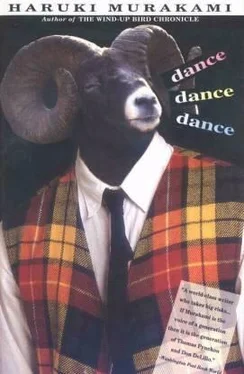Haruki Murakami Dance Dance Dance
I often dream about the Dolphin Hotel.
In these dreams, I'm there, implicated in some kind of ongoing circumstance. All indications are that I belong to this dream continuity.
The Dolphin Hotel is distorted, much too narrow. It seems more like a long, covered bridge. A bridge stretching endlessly through time. And there I am, in the middle of it. Someone else is there too, crying.
The hotel envelops me. I can feel its pulse, its heat. In dreams, I am part of the hotel.
I wake up, but where? I don't just think this, I actually voice the question to myself: «Where am I?» As if I didn't know: I'm here. In my life. A feature of the world that is my existence. Not that I particularly recall ever having approved these matters, this condition, this state of affairs in which I feature. There might be a woman sleeping next to me. More often, I'm alone. Just me and the expressway that runs right next to my apartment and, bedside, a glass (five millimeters of whiskey still in it) and the malicious — no, make that indifferent—dusty morning light. Sometimes it's raining. If it is, I'll just stay in bed. And if there's whiskey still left in the glass, I'll drink it. And I'll look at the raindrops dripping from the eaves, and I'll think about the Dolphin Hotel. Maybe I'll stretch, nice and slow. Enough for me to be sure I'm myself and not part of something else. Yet I'll remember the feel of the dream. So much that I swear I can reach out and touch it, and the whole of that something that includes me will move. If I strain my ears, I can hear the slow, cautious sequence of play take place, like droplets in an intricate water puzzle falling, step upon step, one after the other. I listen carefully. That's when I hear someone softly, almost imperceptibly, weeping. A sobbing from somewhere in the darkness. Someone is crying for me.
The Dolphin Hotel is a real hotel. It actually exists in a so-so section of Sapporo. Once, a few years back, I spent a week there. No, let me get that straight. How many years ago was it? Four. Or more precisely, four and a half. I was still in my twenties. I checked into the Dolphin Hotel with a woman I was living with. She'd chosen the place. This is where we're staying, was what she said. If it hadn't been for her, I doubt I'd ever have set foot in the place.
It was a tiny dump of a hotel. In the whole time we were there, I don't know if we saw another paying customer. There were a couple of characters milling around the lobby, but who knows if they were staying there? A few keys were always missing from the board behind the front desk, so I guess there were other hotel guests. Though not too many. I mean, really, you hang out a hotel sign somewhere in a major city, put a phone number in the business listings, it stands to reason you're not going to go entirely without customers. But granting there were other customers besides ourselves, they were awfully quiet. We never heard a sound from them, hardly saw a sign of their presence—with the exception of the arrangement of the keys on the board that changed slightly each day. Were they like shadows creeping along the walls of the corridors, holding their breath? Occasionally we'd hear the dull rattling of the elevator, but when it stopped the oppressive silence bore down once more.
A mysterious hotel.
What it reminded me of was a biological dead end. A genetic retrogression. A freak accident of nature that stranded some organism up the wrong path without a way back. Evolutionary vector eliminated, orphaned life-form left cowering behind the curtain of history, in The Land That Time Forgot. And through no fault of anyone. No one to blame, no one to save it.
The hotel should never have been built where it was. That was the first mistake, and everything got worse from there. Like a button on a shirt buttoned wrong, every attempt to correct things led to yet another fine—not to say elegant— mess. No detail seemed right. Look at anything in the place and you'd find yourself tilting your head a few degrees. Not enough to cause you any real harm, nor enough to seem particularly odd. Who knows? You might get used to this slant on things (but if you did, you'd never be able to view the world again without holding your head out of true).
That was the Dolphin Hotel. Normalness, it lacked. Confusion piled on confusion until the saturation point was reached, destined in the not-too-distant future to be swallowed in the vortex of time. Anyone could recognize that at a glance. A pathetic place, woebegone as a three-legged black dog drenched in December rain. Sad hotels existed everywhere, to be sure, but the Dolphin was in a class of its own. The Dolphin Hotel was conceptually sorry. The Dolphin Hotel was tragic.
It goes without saying, then, that aside from those poor, unsuspecting souls who happened upon it, no one would willingly choose to stay there.
A far cry from its name (to me, the «Dolphin» sobriquet suggested a pristine white-sugar candy of a resort hotel on the Aegean Sea), if not for the sign hung out front, you'd never have known the building was a hotel. Even with the sign and the brass plaque at the entrance, it scarcely looked the part. What it really resembled was a museum. A peculiar kind of museum where persons with peculiar curiosities might steal away to see peculiar items on display.
Which actually was not far from the truth. The hotel was indeed part museum. But I ask, would anyone want to stay in such a hotel? In a lodge-cum-reliquary, its dark corridors blocked with stuffed sheep and musty fleeces and mold-covered documents and discolored photographs? Its corners caked with unfulfilled dreams?
The furniture was faded, the tables wobbled, the locks were useless. The floorboards were scuffed, the light bulbs dim; the washstand, with ill-fitting plug, couldn't hold water. A fat maid walked the halls with elephant strides, ponderously, ominously coughing. And the sad-eyed, middle-aged owner, stationed permanently behind the front desk, had two fingers missing. The kind of a guy, by the looks of him, for whom nothing goes right. A veritable specimen of the type—dredged up from an overnight soak in thin blue ink, soul stained by misfortune, failure, defeat. You'd want to put him in a glass case and cart him to your science class: Homo nihilsuccessus . Almost anyone who saw the guy would, to a greater or lesser degree, feel their spirits dampen. Not a few would be angered (some folks get upset seeing miserable examples of humanity). So who would stay in that hotel?
Well, we stayed there. This is where we're staying, she'd said. And then later she disappeared. She upped and vanished. It was the Sheep Man who told me so. Thewomanleftalonethisafternoon, the Sheep Man said. Somehow, the Sheep Man knew. He'd known that she had to get out. Just as I know now. Her purpose had been to lead me there. As if it were her fate. Like the Moldau flowing to the sea. Like rain.
When I started having these dreams about the Dolphin Hotel, she was the first thing that came to mind. She was seeking me out. Why else would I keep having the same dream, over and over again?
She . What was her name? The months we'd spent together, and yet I never knew. What did I actually know about her? She'd been in the employ of an exclusive call girl club. A club for members only; persons of less-than-impeccable standing not welcome. So she was a high-class hooker. She'd had a couple other jobs on the side. During regular business hours she was a part-time proofreader at a small publishing house; she was also an ear model. In other words, she kept busy. Naturally, she wasn't nameless. In fact I'm sure she went by a number of names. At the same time, practically speaking, she didn't have a name. Whatever she carried— which was next to nothing—bore no name. She had no train pass, no driver's license, no credit cards. She did carry a little notebook, but that was scrawled in an indecipherable code. Apparently she wanted no handle on her identity. Hookers may have names, but they inhabit a world that doesn't need to know.
Читать дальше












